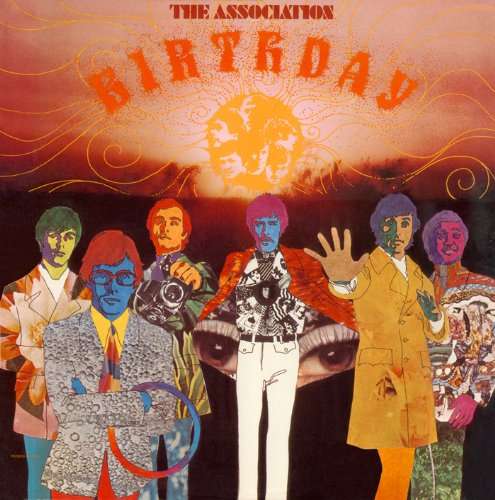The Association are one of those bands that still get frequent airplay on oldies radio stations and at the same time are highly regarded within Sunshine Pop collector and fan circles. The six (and sometimes seven) piece band out of L.A. hit the top of the charts twice, first in 1966 with the chiming ballad "Cherish" and the following year with the choral pop hit "Windy". They nearly hit the top spot a third time with the classic "Never My Love" which hit the #2 spot in 1967. But their deeper album cuts were often as good, and in many cases better than their hits.
Their first record is an oddity. Produced by the legendary Sunshine Pop guru Curt Boettcher, And then...Along Comes the Association (1966) was an unusual mix of the band-preferred folk rock and Boettcher's signature experimental instrumental and vocal blends. Curt, however insisted that he use studio musicians to play the band's instrumental tracks which, of course, led to the ultimate parting of ways, even though the album managed to climb to #5 on the Billboard LP Charts. Their second album, Renaissance, was a much different sounding affair, and much more in tune with the band's folk roots. It lacked a legitimate hit single though, as the band chose the brilliant acid-pop song "Pandorra's Golden Heebie Jeebies" as the lead-off single. Needless to say, it was a little bit too much for the teeny boppers to handle (especially in 1966!) and failed to make any real impact on the pop charts. The rest of Renaissance fails to live up to that song though as many of the tracks come off as a bit bland. The lack of a focused and innovative producer was probably the reason for the sophomore slump the band experienced with Renaissance, but that was soon remedied as the established hit-maker Bones Howe stepped in to produce their third and fourth albums. 1967's Insight Out was their best album to date and it produced the two aforementioned massive hits "Windy" and "Never My Love". Although neither of those two tracks were written by the band themselves the rest of the album's were by and large original compositions from the band members, often writing songs individually.
I really think Bones Howe saved this group, he gave the Association a sound that was much more suited to the band. While Boettcher's production was densely layered and tightly packed (which in itself was a very interesting sound), Howe's production gave the band's expansive vocal harmonies room to breathe among the loose and breezy instrumental tracks, played mostly by the famous Wrecking Crew.
This brings us to Birthday, released in 1968, was the Association's finest album statement. The album was mostly made up of original band composition's mainly by guitarist Jim Yester and vocalist/recorder-ist Terry Kirkman, although Russ Giguere, Larry Ramos and drummer Ted Bleuchel each contributed one song. But it's the album's sound that to me is most alluring. The band's harmonies are clearly the star of the show as Howe's production smartly keeps them front and center. The instrumental blends are nice and subtle, mostly loose drumming from Hal Blaine, some catchy bass lines from Joe Osborne and great echoey, spaced out electric guitar from studio legends Mike Deasy and Tommy Tedesco. Even the orchestral touches are far away from the foreground of the mix, almost barely audible in some places but adding a nice ambiance to the sound scapes.
The album opener "Come On In" (one of the three tunes on the record that is not an original band composition) sets the scene perfectly. Cascading waves of vocal harmonies along side a driving bass line really makes this a highlight of the album. Other fantastic tunes are Kirkman's gorgeous "Everything that Touches You", probably the best example of the sheer complexity and versatility of the 6 part harmony sound that these guys were known for. "Toymaker" and "Rose Petals" are loungey slow burners each with a fantastic vocal from Yester and soothing, airy backing harmonies from the rest of the gang. Yester's "Barefoot Gentleman" is truly a haunting song, with a somber mood and philosophical lyrics that, according to the liner notes, evoked sobs from those who came into the studio to hear the band record the track. Although the album art suggests psychedelia, this album is Sunshine Pop at it's purest form and may be one of the best examples of the genre.
Now Sound's Mono issue is truly the best way to hear this album as the stereo mix suffers from many errors that would plague other stereo mixes from the era, most notably the dreaded "instruments on one channel, vocals on the other" mix. The mono mix strikes the perfect balance as the harmonies are so "wide screen" that even in the mono mix they really engulf everything, so listening on headphones is a pleasure. Pick it up at specialty record shop or just go on amazon and order a copy.
-Casey (twitter.com/thewaykpsu)
I really think Bones Howe saved this group, he gave the Association a sound that was much more suited to the band. While Boettcher's production was densely layered and tightly packed (which in itself was a very interesting sound), Howe's production gave the band's expansive vocal harmonies room to breathe among the loose and breezy instrumental tracks, played mostly by the famous Wrecking Crew.
This brings us to Birthday, released in 1968, was the Association's finest album statement. The album was mostly made up of original band composition's mainly by guitarist Jim Yester and vocalist/recorder-ist Terry Kirkman, although Russ Giguere, Larry Ramos and drummer Ted Bleuchel each contributed one song. But it's the album's sound that to me is most alluring. The band's harmonies are clearly the star of the show as Howe's production smartly keeps them front and center. The instrumental blends are nice and subtle, mostly loose drumming from Hal Blaine, some catchy bass lines from Joe Osborne and great echoey, spaced out electric guitar from studio legends Mike Deasy and Tommy Tedesco. Even the orchestral touches are far away from the foreground of the mix, almost barely audible in some places but adding a nice ambiance to the sound scapes.
The album opener "Come On In" (one of the three tunes on the record that is not an original band composition) sets the scene perfectly. Cascading waves of vocal harmonies along side a driving bass line really makes this a highlight of the album. Other fantastic tunes are Kirkman's gorgeous "Everything that Touches You", probably the best example of the sheer complexity and versatility of the 6 part harmony sound that these guys were known for. "Toymaker" and "Rose Petals" are loungey slow burners each with a fantastic vocal from Yester and soothing, airy backing harmonies from the rest of the gang. Yester's "Barefoot Gentleman" is truly a haunting song, with a somber mood and philosophical lyrics that, according to the liner notes, evoked sobs from those who came into the studio to hear the band record the track. Although the album art suggests psychedelia, this album is Sunshine Pop at it's purest form and may be one of the best examples of the genre.
Now Sound's Mono issue is truly the best way to hear this album as the stereo mix suffers from many errors that would plague other stereo mixes from the era, most notably the dreaded "instruments on one channel, vocals on the other" mix. The mono mix strikes the perfect balance as the harmonies are so "wide screen" that even in the mono mix they really engulf everything, so listening on headphones is a pleasure. Pick it up at specialty record shop or just go on amazon and order a copy.
-Casey (twitter.com/thewaykpsu)


No comments:
Post a Comment